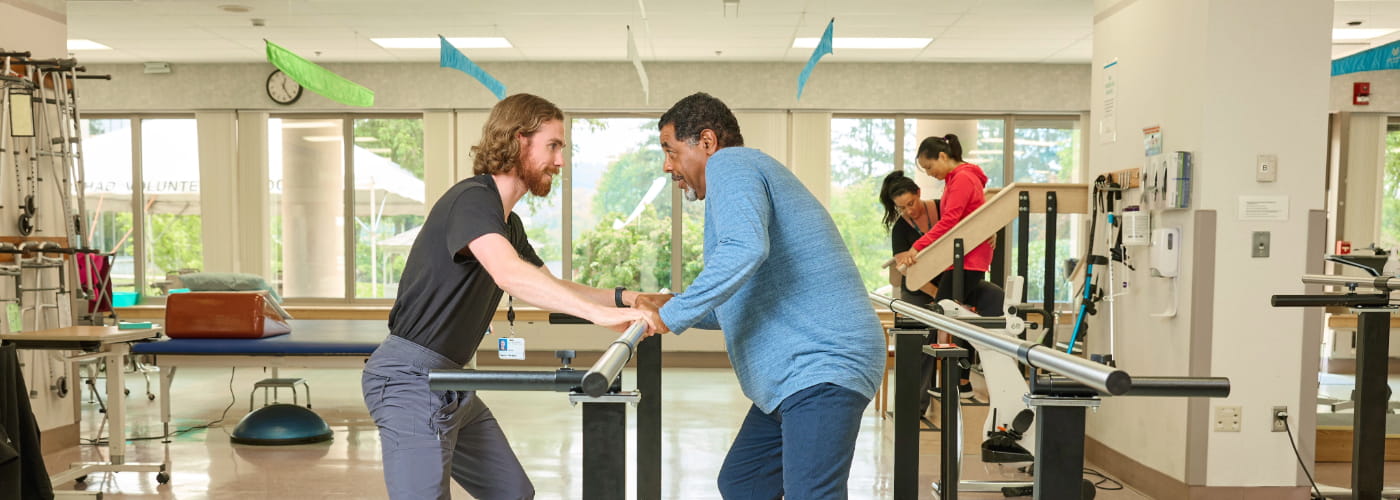Rehabilitation before surgery: How pre-surgical rehab sets you up for success

Preparation increases your chances of success in many aspects of life. From studying for a test to practicing an important presentation to training for a marathon, getting ready for the big event is a key factor in everything going well.
While you’ve probably heard of rehabilitation (or rehab), which supports your body as it heals after an injury or surgery, you may not have heard of prehabilitation — its opposite but just-as-important partner. Prehabilitation (or pre-surgical rehab) is a rehab program that happens before surgery. It helps you prepare physically and emotionally, and it can improve your recovery time after your procedure.
People undergoing a range of surgeries — including joint surgery, heart surgery and cancer surgery — can all benefit from pre-surgical rehab. If you or someone you know plans to have surgery, consider pre-surgical rehab as a way to help the process go smoothly.
What happens during pre-surgical rehab?
While rehabilitation that occurs after surgery helps your body heal once the surgery is complete, pre-surgical rehab gets your body into its best shape possible before the procedure.
Pre-surgical rehab includes exercises to improve:
- Muscle strength
- Range of motion
- Aerobic capability
- Balance and walking
- Flexibility
"Pre-surgical rehab also addresses concerns that might affect your healing after surgery, such as poor muscle mass or excess body fat. If you support the well-being of your body before surgery, it will be better able to handle the stress of the procedure," says Lauren Feinberg, PT, a physical therapist at Bryn Mawr Rehab Hospital.
During pre-surgical rehab, you’ll also focus on education and how to avoid other factors that contribute to surgical complications, such as low nutrients, smoking and alcohol use.
Pre-surgical rehab and your body
Surgery is a major event, and it puts extra stress on your body. The best way to improve your body’s ability to manage that stress is to ensure it’s as healthy as possible.
Physical fitness
"Rehab improves your physical fitness, which is essential to healing after surgery," says Lauren. "For example, if you have joint replacement surgery, you can prepare and strengthen your muscles. What’s more, pre-surgical rehab will get you comfortable with exercise in general, which could help you with recovery after surgery."
As for joint surgery, including hip and knee replacements, pre-surgical rehab can reduce pain, shorten hospital stays, and improve joint function after surgery.
The physical benefits of exercise also extend to cancer surgery, including for colorectal cancer, lung cancer, stomach cancer and prostate cancer. Both aerobic and strength exercises will improve your strength and help you recover after surgery.
Mobility
Mobility is also a focus of pre-surgical rehab . After many kinds of surgery, you’ll need to reduce your activity levels. This can impact your ability to move around and complete everyday activities. By working on your mobility before surgery, you can improve your recovery afterward.
Pre-surgical rehab and your mind
Surgery can impact your emotional well-being, too. Anxieties about the procedure, concerns about life post-op and feelings of unpreparedness may make you feel uncertain heading into the operating room.
Pre-surgical rehab gives you the opportunity to prepare your mind for surgery, including by asking questions and feeling more confident about your body’s capabilities.
It also helps you learn more about recovery, allowing you to prepare for this transition. You can better understand when you’ll be able to get moving and how to do so safely (which may include post-operative rehabilitation).
Pre-surgical rehab: Preparing to heal after surgery
"Pre-surgical rehab is crucial to a patient’s success and there are so many ways to enhance the preparation and mindset of wellbeing," says Lauren. "Because anxiety greatly influences the duration of a patient’s care, meeting with the patient prior to surgery is crucial to breakdown the unspoken barriers that influence outcomes."
Any kind of surgery places extra demand on your body and mind. As with many things in life, preparation makes the process easier and more manageable. By ensuring your body is in its best possible state and your mind is at ease, you’ll go into your surgery fully equipped to recover afterward.
Next steps:
Learn more about Lauren Feinberg, PT
Learn more about outpatient rehabilitative therapy
6 reasons to go to rehabilitation
 Content you want, delivered to your inbox
Content you want, delivered to your inbox
Want to get the latest health and wellness articles delivered right to your inbox?
Subscribe to the Well Ahead Newsletter.
